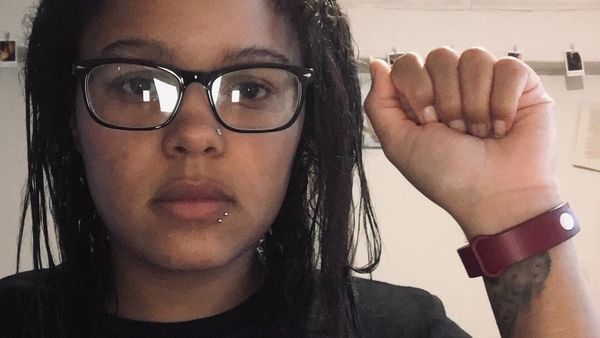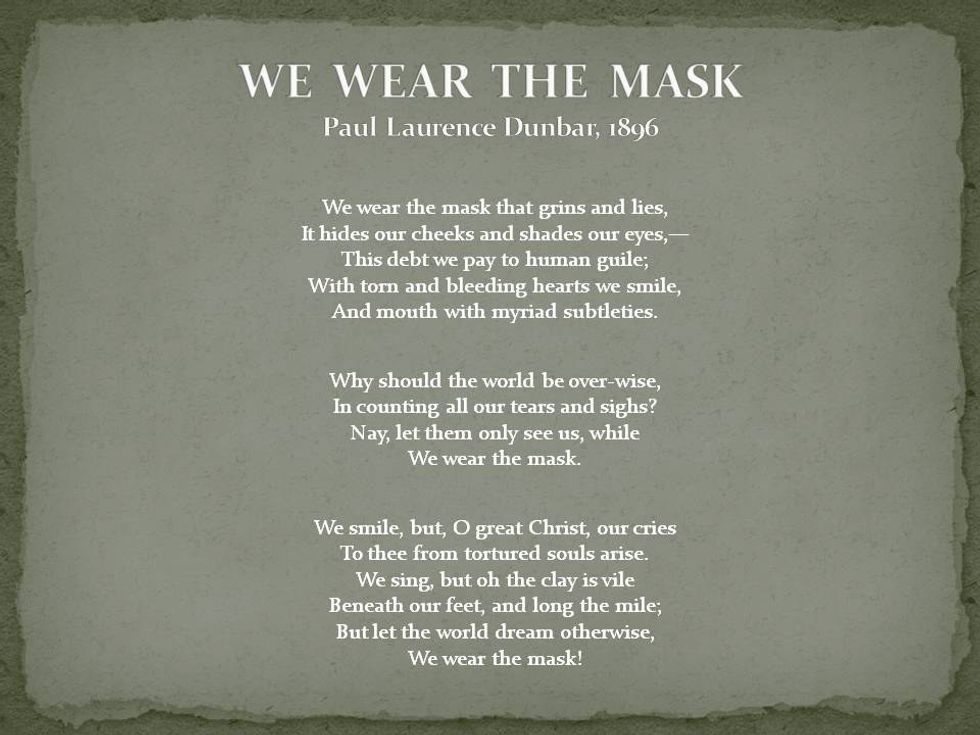“We wear the mask that grins and lies,/ It hides our cheeks and shades our eyes,/ This debt we pay to human guile;/ With torn and bleeding hearts we smile,/ And mouth with myriad subtleties.” Dunbar, 1896.
It is finally December of one of the most historic years of millennials’ existence. It’s the time of year where we start reflecting on the entire year and building goals and resolutions for next year. One of the most important questions hanging in the balance of 2017 is: how will we move forward in this era of Trump? This is a question that affects all political views alike. Particularly in this last year, the personal has become the political in a way that society hasn’t seen since the second wave of feminism. The binaries of race and politics have been polarized in such a way that it feels as though we are at the precipice of a civil war. To some, that may seem dramatic.
But when we consider the human rights violations taking place over the Dakota Access Pipeline, the spike in hate crimes post-election, or ISIS lurking on the outskirts, ready to claim responsibility for certain acts of violence, suddenly it doesn’t seem so far off the mark. On a personal level, people of color are angry, hurt and scared. In the larger scheme of things, we are systematically disenfranchised. It is our American right to stand up against this, to stand up for our people. Yet because equality is a perceived loss of power to the majority, we are continuously silenced or ignored. The wide variety of protests that have taken place this year is proof of that.
Black Lives Matter protests popped up in Ferguson and the many other cities where unarmed black men died at the hands of police. Most were peaceful. In Baltimore, a group of other protestors – who may not have even been affiliated with BLM - looted stores and damaged property. These violent protests were associated with BLM, and condemned.
Berkeley students formed a human chain to demand more safe spaces for transgender and nonwhite students after Trump’s election. In doing so, they prevented white students from getting through one of the campus’s main walkways to class. They allowed nonwhite students to go through the chain. This provocative protest was condemned.
Beyonce performed "Formation" during the Super Bowl halftime show and her backup dancers dressed up as Black Panthers. She was protesting the police brutality that is overwhelmingly effecting the black community. Her creative protest was condemned.
Colin Kaepernick decided to kneel during the National Anthem also to raise awareness about the racial disparities regarding our law enforcement. Football fans burned his jersey and others complained about his method of protest, but not his reason for protest. In other words, this silent protest was condemned.
North Dakota literally looks like a battlefield. Water Protectors were doused in water in cold temperatures, police dogs were attacking people on command and a woman even had her arm blown off. The Water Protectors are being maced in the face while shouting things like “We’ll pray for you” and “We love you” to the police. These peaceful protesters are being condemned.
In 1896, African American poet Paul Laurence Dunbar published the poem “We Wear the Mask.” He was talking about slavery, and how it’s lasting impact was both physical and emotional. It was an impact that has passed on through generations up until even our present time. He talks about black people wearing these masks and pretending to be happy in order to survive this oppressive system. There are echoes of this sentiment in the way particularly communities of color are tone-policed, or the way we tone-police ourselves. We must always manage our emotions, so as not to anger white people. If we are angry and violent, they will get defensive. If we are sad or subdue, they will not take us seriously.
But people of color aren’t the only ones wearing masks. There are plenty of people claiming they too want equality, and they want to work together to perfect this nation. Just as In Dunbar’s poem, those “smiles” aren’t real either. The interview between Trevor Noah and Tomi Lahren was just one example of many in which the majority are so quick to tell minorities how not to protest, but can offer no useful or helpful insight into how we should protest. It is easier for them to focus on the method, rather than the message. What does this diversion tactic communicate to minorities? We cannot protest. We should not protest. We must be silent and compliant in our oppression, and criticizing that oppression in order to move forward as a nation is not nearly as important as perpetuating the very systems that white people continue to benefit from.
2017 is an opportunity to move forward in our hope. The conversations cannot stop. We cannot allow ourselves to be distracted by the diversions mainstream media pose as news. We all need to validate these emotions and listen through them to get to the root of these problems. It is time to take off the masks.






















